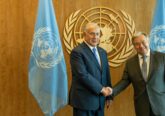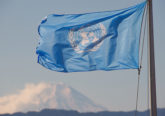
At the University of Oxford Alumni Weekend, 17 September 2011, Dr Hugo Slim and Professor Jennifer Welsh, from the Oxford Institute for Ethics, Law and Armed Conflict (ELAC), discussed the concept of the ‘Responsibility to Protect’ or R2P in contemporary international relations, and its role in key cases such as Libya and post-election violence in Kenya.
Dr Slim discussed the rise of the idea that certain people should be protected in times of war, suggesting that the word ‘civilian’ became a centrepiece of policy during the Bosnian War of the 1990s. He went on to talk about the role and types of ideology that encourage violence against civilians during conflict. Anti-civilian ideology, or the idea that a whole group of people must be eliminated, is at the core of events such as the Holocaust during World War II and the Rwandan genocide. Another is dualistic, that is, the acceptability and even nobility of dividing the world between friend and foe and killing as many of the enemy as possible.
Power dominance and the desire to subjugate can bring about other such conflicts, while revenge, often “masquerading as justice,” can also be a powerful ideology in conflict, as can compliance. Another is the perception of necessity or effectiveness, as with the British bombing of Germany during World War II. At that time, Churchill famously suggested that a suspension of one’s own beliefs and values was necessary to achieve them. A sense of sacrifice or of “shedding blood to change the world” can also motivate civilian deaths, a prominent theme within Christianity.
Dr Slim pointed out, finally, that the ambiguity of civilian identity can come into play during war, suggesting that the ‘Western’ world had largely respected the distinction between civilian and combatant. An interesting question to discuss here would have been whether callous targeting that brings about multiple civilian casualties may blur this distinction. A question later posed by an audience member on how to define civilians prompted Dr Slim to add that the sometimes questionable neutrality of civilians can bring about challenges in making that definition.
Professor Jennifer Welsh then discussed the origins and evolution of the ‘Responsibility to Protect’ civilians or R2P. The experience of colonialism created a strong sentiment against intervention among newly independent states, but as the Cold War era ended, Francis Deng, then Special Representative of the UN Secretary-General on Internally Displaced Persons, developed the idea that “sovereignty entails rights contingent on ‘sovereignty as responsibility’.” Two horrific events were also brought to the world’s attention in the 1990s: (i) the inaction of the global community while over 800,000 people lost their lives in the Rwandan genocide and (ii) a widely favoured intervention in Kosovo that lacked authorization due to opposition from China and Russia. Building on Deng’s concept, the R2P came about as a reaction to these conflicts.
The permanent five members of UN Security Council, however, were initially reluctant to sponsor a notion implying both additional responsibilities and the right to intervene in the internal affairs of sovereign states. A 2005 UN agreement on the R2P resolved these concerns by avoiding any legal obligations, defining R2P as a ‘UN responsibility to protect’ and subject to negotiations within the UN Security Council, and narrowing the focus of the R2P to four specific crimes: genocide, crimes against humanity, war crimes, and ethnic cleansing or mass atrocities.
Professor Welsh added that the case for intervention is thus dependent on the Security Council’s “messy politics” and broad definitions of such crimes. In terms of Security Council politics, however, the increasing economic bargaining power of countries like India and Brazil in the midst of a global debt crisis may bring about changes in the future. She said that UN intervention is already a global effort, with Bangladeshi and Ghanaian troops, among others, having a significant presence among peacekeeping forces.
Professor Welsh then discussed lessons from the application of the R2P with the examples of Kenya in 2007 and Libya this year. In Kenya, roughly 1,300 people died in post-election violence. With the involvement of Kofi Annan and the country’s significance in regional politics, however, mediation efforts to resolve further violence received unprecedented support. Particularly notable was the backing of mediations with coercive threats against individuals, recognizing that individuals, rather than the state, were responsible for violence.
In Libya, another “unusual confluence of factors” enabled action. There was not only a clear, explicit threat made by Gaddafi but also great regional support for intervention. Additionally, France was eager to motivate discussion while China was convinced to abstain on the basis of regional support. Notably, for the first time in its history, the UN authorized the use of violence without permission from the state receiving intervention thus, perhaps inevitably, “choosing sides” in this conflict.
With this, Dr Slim and Professor Welsh both highlighted the fact that the Security Council is a political body, neither following nor bound by international law. Mixed motives, both moral and strategic, are the norm in determining the nature of violence and intervention on the behalf of civilians. Ultimately, identifying those situations in which intervention under R2P is an appropriate course of action remains a highly challenging, case-specific endeavour.
Please listen to the audio podcast or watch the video podcast. Please note that these recordings are not released under a creative commons licence.
Jennifer Welsh is Professor in International Relations and co-director of the Oxford Institute for Ethics, Law and Armed Conflict.
Hugo Slim is Visiting Fellow, ELAC and Director, CforC Ltd. Research interests: The protection of civilians; Humanitarian ethics; Business and violence; Corporate responsibility and ethical dilemmas in fragile states.
Tahrat Shahid is currently writing her DPhil dissertation in the Department of Politics and International Relations at the University of Oxford on the sexual equalization of inheritance laws in Bangladesh.








No Comment